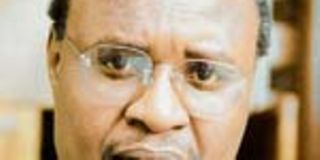Murungaru's troubles, then the sack

Dr Murungaru

Mr Murungaru
Dr Christopher Ndarathi Murungaru's loss of a Cabinet position appears to be President Kibaki's way of tipping his hat to the donor community as well as anti-corruption lobbyists.
Dr Murungaru, the MP for Kieni in Nyeri District, was seen as a close ally of the President. He is considered by many as a political heavyweight from the Mount Kenya region. Dropping him must have taken a lot of soul searching by the President, who would have loathed to lose one of his most loyal ministers.
However, President Kibaki may have wanted to show that there was no sentimentality in his choices. He may have also wanted to show some balance after dropping the seven LDP rebel ministers led by Lang'ata MP Raila Odinga.
In his speech announcing the new Cabinet, President Kibaki said he would be according high priority to integrity in the public service.
Said the President: "I expect the new ministers and assistant ministers to strictly adhere to a new code of conduct and a management accountability framework intended to enhance collective responsibility, ethics, accountability and results in Government. The Government has to lead by example."
This could been a veiled explanation as to why Dr Murungaru, who was not seen as being above suspicion, was dropped.
Dr Murungaru served in Mr Kibaki's first Cabinet as the minister in the Office of the President in charge of Internal Security. After allegations of corruption, many of which seemed to point at his management of the ministry's affairs, he was dropped early this year and shifted to the less glamorous Transport ministry where he swapped positions with Mr John Michuki.
While in the security portfolio, Dr Murungaru regularly came under fire from within and without Kenya and particularly from the former British high commissioner, Sir Edward Clay, amid allegations of grand corruption during his tenure as minister. During his time at the Office of the President (OP), Mr Murungaru had a series of public disputes with the immediate former British High Commissioner to Kenya, Sir Edward Clay, who was a vocal critic of the Kenyan government's record on tackling corruption.
Sir Edward claimed to have handed the Kenya Anti-Corruption Commission a dossier of 20 allegedly "dodgy deals" the envoy said warranted investigation.
More than half of the scandals were centred on the security department, although Dr Murungaru has never been charged with any corruption offence.
At the time Dr Murungaru hit back at his detractors, saying the claims were "bizarre" and the product of sour grapes because British firms were losing Government contracts to newcomers from the Far East.
He was also said to have had a number of run-ins with Mr John Githongo, who quit his post as permanent secretary for Ethics and Governance in the OP in January this year. Mr Githongo resigned and went into exile in Britain just days after the Government was accused by donors and foreign envoys of "massive looting."
Kenya continues to be ranked as corrupt, despite President Kibaki's Government being elected on an anti-corruption platform.
Once in the Transport ministry, mid this year, Dr Murungaru thought he would have a quieter ride, but almost immediately he arrived in the new ministry, other troubles landed at his feet.
In July, Britain refused Dr Murungaru a visa to enter the country. In an angry statement once the news became known, Dr Murungaru said he believed Sir Edward had engineered the ban. Sir Edward denied having anything to do with it.
Three months later, in October, as Dr Murungaru instituted legal action against the British Government demanding to be told why he had been denied a visa, and claiming he had been defamed, the United States banned him from stepping on its soil.
The US ban was imposed under a new legislation barring officials perceived to be involved in corruption from entering America.
Furious at this further action by a foreign government, Dr Murungaru said the US decision was instigated by the British Government to "legitimise its own action against him".
He repeated that he had done nothing wrong and called on the two governments to make public any evidence they had against him. He then instructed his lawyers to see if he could challenge the ban in the US courts.
Speaking in his own defence at the time, Dr Murungaru told the Nation that the US and UK had "teamed up with a certain political clan" and that "their objective is a regime change... or at least a dictate of who should sit in the Cabinet and who should not."




